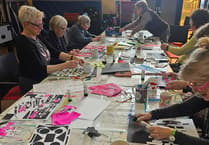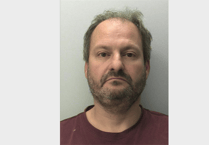Best-selling author Cate Quinn went the extra mile for her latest thriller, The Clinic, by drawing on her own harrowing experiences. In this candid interview, she reveals her own past troubles with addiction and the insecurities most celebs face.
At first glance, The Clinic appears to be a typical thriller. It’s a fast-paced, murder mystery that in this case is set in a remote and somewhat sinister rehab clinic for celebs. Hardboiled characters abound and there is a passing nod to the film-noir genre.
But the novel also stands out for a rather more significant reason - Totnes-based author Cate Quinn wrote it following a stint in rehab for alcohol addiction. She describes this period of her life as “quite a dark time”, but she channelled that trauma as only a writer could by including many of her personal experiences in the book.
The Clinic hit bookshelves in the UK this week (January 18), but US critics have already had an opportunity to read it. So far, it’s won plaudits from none other than the country’s librarians, who have listed it as one of their top-10 books for January on the NetGalley reviewers’ site.
“It’s definitely been very popularly received there. I’m hopeful it will have a similar appeal in the UK,” she says, doing a good job of speaking to me over the phone while simultaneously marshalling her two young children, who can be heard testing her patience in the background.
What next? A film version? It turns out that one of her previous works was optioned for a film adaptation, although it’s too early to say if The Clinic will follow the same route. I point out that as thrillers have traditionally been dominated by male writers and characters, was she consciously trying to avoid that literary trope?
“I’m always drawn more to the thriller side of crime, and that is definitely more of a male genre classically, but I don’t consciously flip it and make it a female version. There was always an understanding that men weren’t drawn to buy books written by women. I don’t know if that’s changed or not.”
On past evidence, she could argue that it hasn’t. The first books she wrote were historical thrillers, but following advice from those in the know she used the name ‘C.S. Quinn’ “in order not to put off men”.
“I did get more than one person write to me and almost say ‘I can’t believe you’re a woman, you write like a man!’ Gender issues are very interesting. I’m of the opinion that gender is mostly socially acquired, anyway. But it’s definitely come up in my work previously.”
Discussing addiction is never easy, but Quinn is more than happy to open up about her experiences, even though there’s a nagging feeling that it’s still an issue she has not fully resolved. It's a burden sufferers in general have to carry, but maybe more so for those who are constantly in the public eye.
I mention the writer Christopher Hitchens who once described downing a whiskey in the morning as the “breakfast of champions”, and ‘The Road Dog’, a new film about a jobbing stand-up comedian who thinks he cannot make people laugh unless he’s drunk. At which point did she realise that she could stop drinking and remain creative?
“I was very concerned that if I stopped drinking alcohol I would never be able to write another book. I was waiting until the reader came back with their thoughts on this book - that would be my answer.” By readers she means critics who, by her own admission, tend to be “a little bit harsher”.
I suggest that it’s dangerous for artists to rely on approval.
“It’s a curse of celebrity in general. Authors are not celebrities in the same way, but you have this void at the heart of you that you’re desperate to fill with external approval, and it’s simply because in order to reach any level of success as an author it’s just so incredibly hard and demoralising.
“You get treated really quite badly along the way, and no sane person would put themselves through that and keep going. Certainly, most of the authors I know are similar in that we freely admit that we’re a tiny bit broken, but hopefully not in a bad way.”
She was previously a travel and lifestyle journalist for The Times, The Guardian and The Daily Mirror, so it’s hard not to conjure up an image of the boozy hack. Did the pressures of the job drive her to drink?
“I would say it didn’t help. Normally any kind of addiction is because of some sort of trauma that hasn’t been processed, so you’re trying to deaden it with alcohol and almost self-medicating. That really went back to my childhood. The fact that I ended up in an industry where drinking was quite common and not frowned upon I think might have been no accident. That was appealing to me. Back when I was a journalist (in the 2000s) you’d still have these boozy lunches. There were always big parties with flowing alcohol, so it probably didn’t help that that culture made it very normal to drink and that the business of being hangover was a badge of honour.
“Most writers tend to be on the higher side of the empathy spectrum, so we feel everyone’s pain and emotion, so that’s why we want to write about it and not channel it into something else. It can be quite tiring, and alcohol is a way of not getting the full body blow.”
The brutal price of success may sound like a cliched subplot for another thriller, but there’s also a disarming honesty about the comment. Was writing The Clinic a more emotional process than with her other books?
“In part, yes. I do a lot on my personal experiences to get some of the more emotional scenes, but that said with my books they normally always include something that’s personal to me.”
Blood Sisters, about two American bar maids who end up in an outback pub when someone is murdered, is a case in point.
“I had worked in that bar environment and knew how it felt; to be in that level of vulnerability. The book before that, Black Widows, is about a woman in a bigamous marriage whose husband is murdered. That also drew on my kind of childhood experiences with religion. My surrounding family, if you like.”
Aside from drawing on her own experiences at rehab, Quinn dived deep into the world of poker, reading books on the subject, going to casinos and picking the brains of poker players.
“I was lucky enough that my editor at the time was a poker player, so he was able to give me some expertise, but I also spoke a lot to brain surgeons and doctors, so that was a very interesting part of my research.”
While researching for her next novel, she stayed with the Sacre-Coeur nuns in Paris. As luck would have it, she also found out that nuns are not tee-total. So much for the perils of journalism.
“I was quite surprised that there was wine on the table at dinner. I didn’t drink it, obviously, but I guess it’s because they’re Catholic and they have the wine because it’s the body of Christ. It’s not uncommon for nuns to be alcoholic, they do have access to alcohol and there’s a whole network to help alcoholic nuns.”
Will that be a theme in her new novel?
“It’s such a tough one with the nuns because they were so lovely and I definitely know they would not really appreciate it. It’s a tricky one...they would not approve of a murder mystery set in a convent, and yet there’s so much drama there.”
The Clinic is published by Orion.




